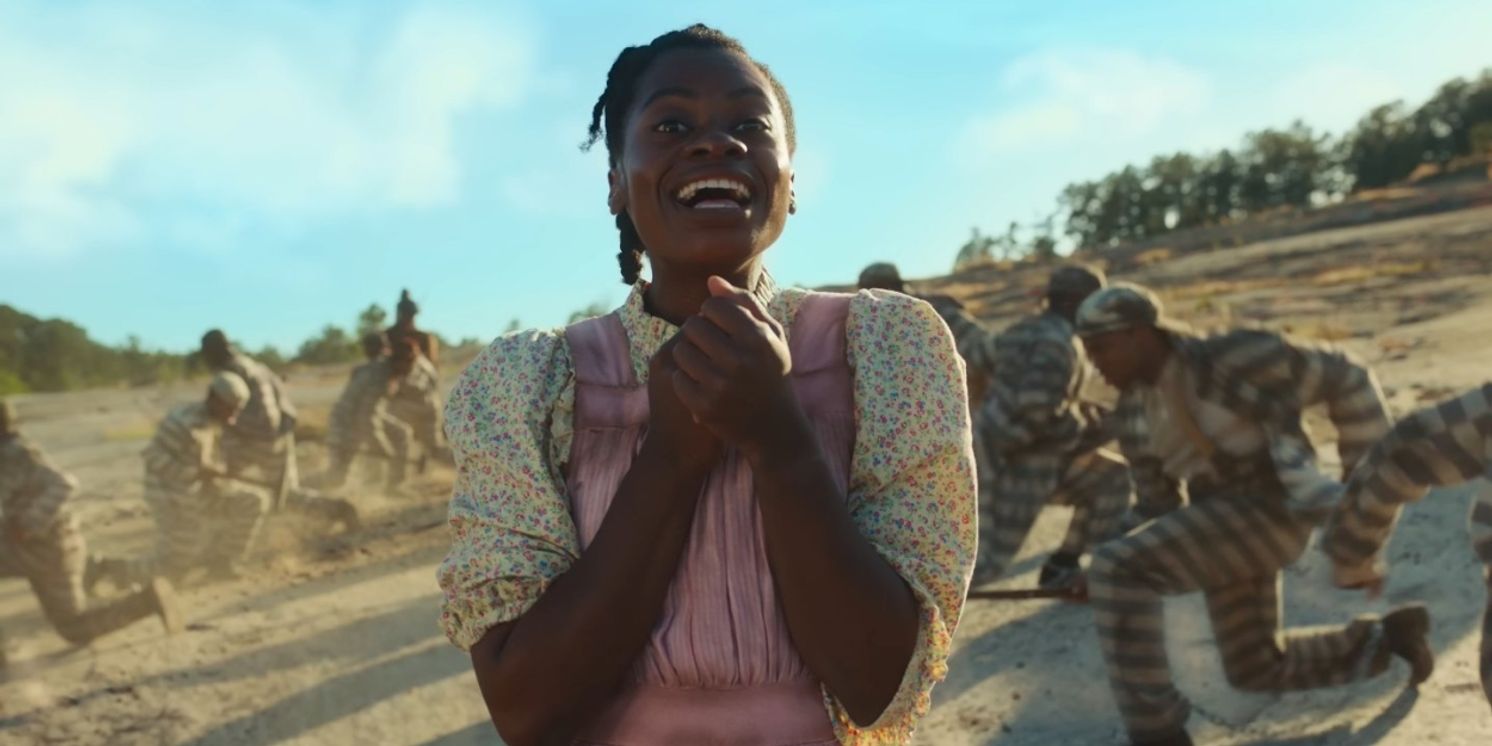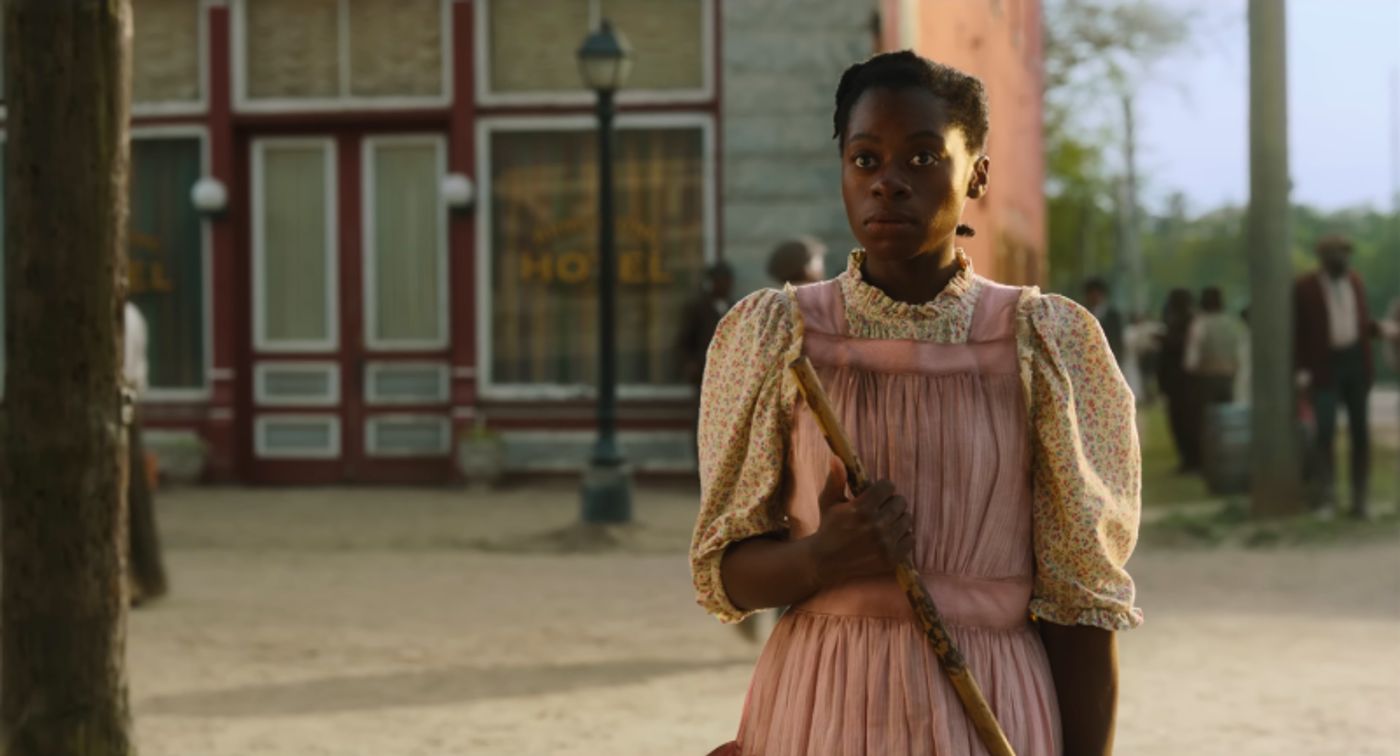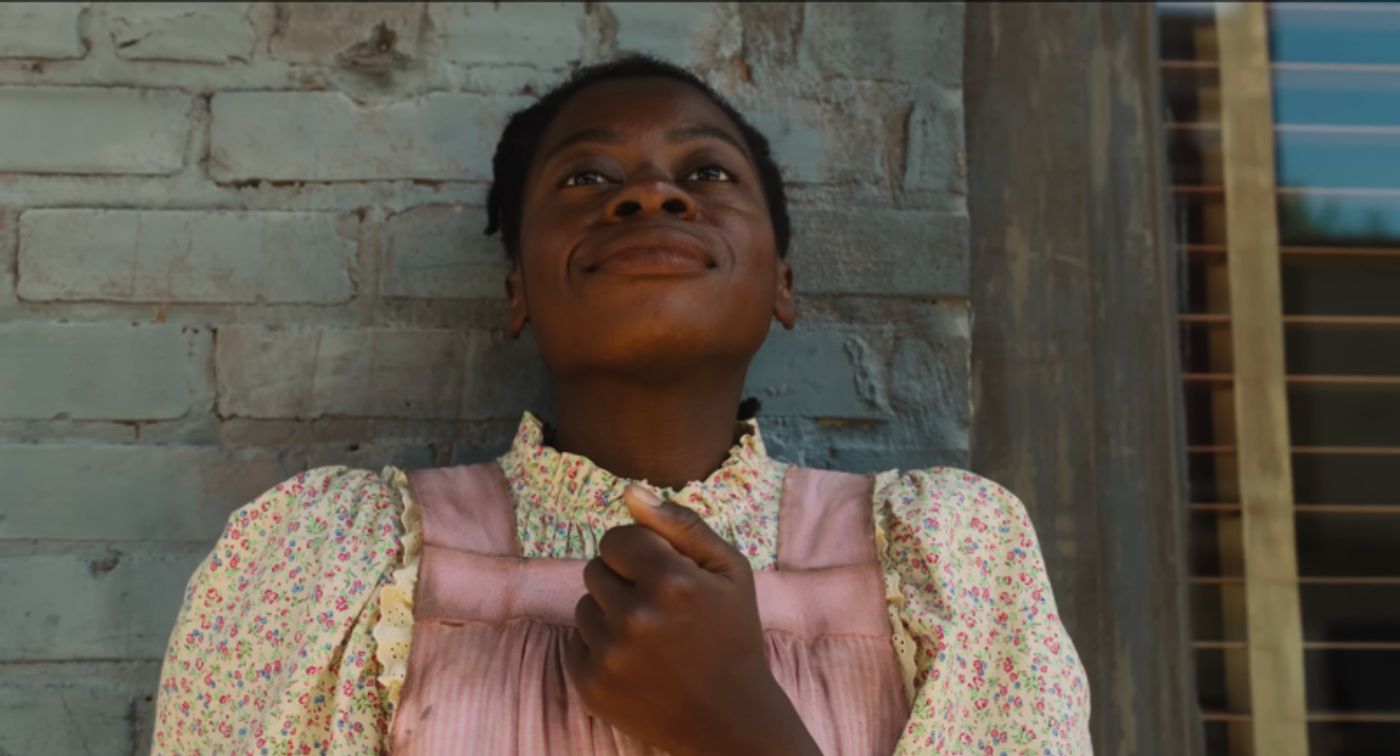Interview: Phylicia Pearl Mpasi on Going From THE LION KING to THE COLOR PURPLE
The Color Purple hits theaters on December 25.

At the beginning of 2021, Phylicia Pearl Mpasi that wrote down on a piece of paper that she wanted to star in a movie musical.
Following several runs as a swing in The Lion King on Broadway and on tour, the rising star was ready to take the leap to the big screen. One year later, she got the call that she would be playing Young Celie in the new movie musical adaptation of The Color Purple.
In theaters December 25, Mpasi shares the role of Celie with Fantasia Barrino. Also appearing in the film is Taraji P. Henson, Danielle Brooks, Corey Hawkins, Colman Domingo, and Halle Bailey, her scene partner throughout most of the film.
BroadwayWorld sat down with Mpasi to discuss the transition from stage to screen, sharing the role of Celie with Fantasia, how Halle Bailey supported her on set, and more.
The Color Purple has been around for a long time, but when were you first introduced to the musical itself?
It wasn't like a deep, deep introduction, but I remember being in the car on my way to school when they announced on the local radio that Fantasia would be doing it on Broadway. I had no idea what this show was, but I just loved her from American Idol, so that's how I first was introduced to it. Then of course I went to school to study musical theater, so then I was just like looking at it from an educational standpoint and just learning the history of it.
I auditioned for it in 2015. The production at Danielle Brooks was a part of, so then I got to know it even more. I did not get that, but here we are.
You were on Broadway in The Lion King. So what was it like to take that leap from Broadway to movie musical?
It's something I always wanted to do. Theatre has my heart. I will always find a place for it, hopefully in my schedule and in my career. I left the Lion King in 2018, with the belief that I was actually going to go into writing for television first. Interesting. I was a swing. I just knew the show so well that they would just put me back and forth between the tour and Broadway, tour and Broadway, tour and Broadway. I did that for a couple years up until the pandemic.
I like to work. So once it looked like film was finding a way to come back, I was like, "Okay, let's figure out how I can get some film because it doesn't seem like theater is gonna be able to come back for a while." So it's always where I wanted to be. I wanted to be in a movie musical. I wrote down at the top of 2021 on a piece of paper, like "I will be in a movie musical by the end of this year." I am so inspired by Ariana DeBose's trajectory. I feel like she made the transition as well. I was just watching her journey and I was like, if she can do it, she's kind of opening my eyes to taking the skill set that she had and finding the perfect project to have it translate on film and then have it open other doors.

Going into the like performance aspect of it all, there's obviously such a different way that you're communicating with the audience and performing in a movie musical as opposed to a live Broadway show. What was it like performing those musical numbers for the camera?
It's something I definitely had to learn. My instinct being a theater performer is like arms out, head up, into the last person in the balcony and try to connect with them. I had to be very clear about the movement because the camera picks up everything. I had to learn how to find like an intimate connection with an inanimate object. It was a trip. Not even a connection with the object, you don't look at the camera. My instinct was at least to have my eye focus on something where you're looking either above or to the side or you're connecting with your scene partner but I'm also trying to cheat out all the time.
I just had to take some of the theatrical rules that you learn and put them to the side, especially things like never turn your back to the audience. I would be directed to walk away and it would look weird because I'd try to walk sideways. It was definitely a learning curve. I'm really grateful that this production and this film was stacked with people who came from theater. So they knew exactly what I was going through, what I was talking about, and gave me advice.
I think on stage, you embody the character in a way that like 3,000 people can see it. Especially something like Lion King, the puppets are the main event in that show, and that's drilled into us that we are a vessel for the creative vision of the show, which is, I think, what makes it very beautiful, and we really bring the puppets to life.
In this version, the director really talked to me about how you are the focus, your body, your skin, the way you move, the way you sound. The audience is going to be focusing solely on you. So I had to get really comfortable with myself, and comfortable with my body, and comfortable with how I move.
I had to get comofortable within myself and finding that in the character of how she would move, how she would sound, how she would stand in a way that was so different than what I did from theatre.

You also have a new song in this movie that's new to the musical, "She Be Mine." What was it like bringing that to life?
Again, it's so crazy. I had to take what I learned from theater and from voice lessons and just only allow that to be a base for the song. My instinct was to "theatricalize" it and bring like a big belting sound whenever I could, beause that's just kind of what we're trained to do and especially where I saw like the notes on the page where the song was going, I was like, "Okay, I know how to sing this."
I sang it one time through and their response was, "That is very, very beautiful. It's not the song." The song is a blue, rhythm and blues song that is part of someone's imagination. This character is someone who lives in her head, but she's a little docile. She's quieter. She won't necessarily express herself through that voice. So I had to take that and then find out how to vocalize that in the song.
It's so great that they gave me a lot of freedom when it came to the song. I am, besides the demo, I'm the first person to sing it. So they were like, "You are the prototype of this. Once this goes out and it's recorded, you'll be associated with it. So what do you want it to sound like in perpetuity and for years and years and years to come?" This was a dream come true. I've always wanted to record something that's like mine. The song is "She Be Mine" and the song be mine. It's just so fun.
Getting to work with Stephen Bray, the original composer, and him telling me very early on that this was like one of their favorite songs that they just had to cut from the Broadway production. I wanted to do it justice, because it's so rare that you get to hear a song that you didn't get to do the light of day in its original form, and then to come back in this way, I think it's really beautiful.

That's one of the really exciting parts of this movie. It's so theatrical, especially that number with the waterfall and the dancers. It really is this incredible blend of everything you would want.
I think what it did is it gave me permission to rely on the actual elements. On stage, half the time you and the cast are creating the stage and the scenery and the setting. You have to ask the audience to go on a journey with you and imagine what is around. In The Lion King, we're not in an actual savanna. There's no dirt on stage. We're asking them to believe that we are the animals. With this, everything was there for me.
When I felt my feet in the water, I just imagine that Celie is someone who maybe doesn't see water often. I'm just thinking like, "How did she find this waterfall?" It's interesting that water is the thing that she's drawn to. I personally find water to be so healing. I'm also a Scorpio, so water is everything to me. I'm a water sign. My favorite thing about it is the color. I just love that they made the choice, from a costume perspective and a direction perspective. to have her stand out in that pink against the waterfall. I think it is so great. It pops, and my favorite thing about it is that it invokes an innocence to me and a childlike nature that this child has never really got to experience because of the circumstances in her life.
It's such a stunning number. I loved it.
Thank you. It was so fun to do. It was like a shoot we had to keep pushing back and pushing back and pushing back because of the elements and rain. When we finally finished it, it felt so triumphant for everyone around.
Switching gears a little bit, the transition from you to Fantasia as Celie in this movie is so seamless. What was it like working with Fantasia and sharing the role of Celie?
She is just the best person in the world, and I could not ask for someone else to share this with because she said that she wanted to be for me in this industry, what she wished that she had when she was coming up. Any question I had, she answered. I would go watch her on set anytime that I wasn't working and just look at her body, look at her mannerisms, her voice.
By design, we weren't able to like sit down together many times and have an actual conversation. But I think it is, in part, the magic of casting, the magic of the film, the magic of Alice Walker's beautiful pieces that they brought together, Fantasia and myself, two black women, in very different walks of life. Yet our trauma and experiences and how we worked ourselves out of that trauma was so similar. I think it was just an indication of how Celie is going to live as a character, that people are gonna be able to relate to her no matter where you come from. At the end of the day, she's just a hero.
I've been on this journey, I know Fantasia's been on it, of finding our voices and being a hero in our own lives. I think we both just brought that to the character and understood the responsibility that we had to do it justice.
You also have a lot of scenes with Halle Bailey. What was it like working with her and having her be your scene partner in this film?
She is the sweetest person on the face of the planet. It's so interesting, from the moment we did our chemistry read, she was like "Do you want to go over the lines? Do you have any questions? Do you need anything?" Just was already in that very protective, supportive state with me and that totally translated onto set. It was a new environment for me. She knew that, so at every turn, whether it was like holding my hand to get our mark together or seeing that I was kind of tired and giving me permission to say no, or I need a break. She was just the most supportive person.
It was so great that she got her own number in this one that she co-wrote because I got to have my little Halle Bailey concert on set. She could just sing to me and we just really embodied sisterhood really quickly.

It sounds this movie was so perfectly set up for you. What does it mean to you to be a part of this moment in culture with this film?
Oh my gosh. It is a dream come true. You know, it narrates all the things that I've loved. I've married all the things that I've been training for. Before my audition, I was making YouTube videos in my mom's basement that nobody saw and I took my skills of editing, because when you do a self tape, you are expected to sing it in one take and then send it off like that. But I was like, "This has to be perfect." So I would sing a line and then lipsync to the camera and edit it together and then sing a line and then lipsync to the camera and edit it together so it looks like one cohesive take. They had me sing "I'm Here" and if you know that song, it is hard. So I was like, "I'm not gonna embarrass myself. I'm getting this part."
It just was a perfect marriage of all those elements and all the skills that I had. It came at a time where I finally found myself as a performer and found exactly what I want to be in this industry. For this to be the first big thing that I get to do, my introduction into the world, I'm just so grateful.
I just hope that it resonates with people and that people learn to love it. Especially for my theater friends, we don't have to be put in this one box as the theater performer. We really can step outside of ourselves and step outside of the limitations the industry might set on us and do whatever we want.
Watch the trailer for The Color Purple here:
Photos Courtesy of Warner Bros.

Videos


